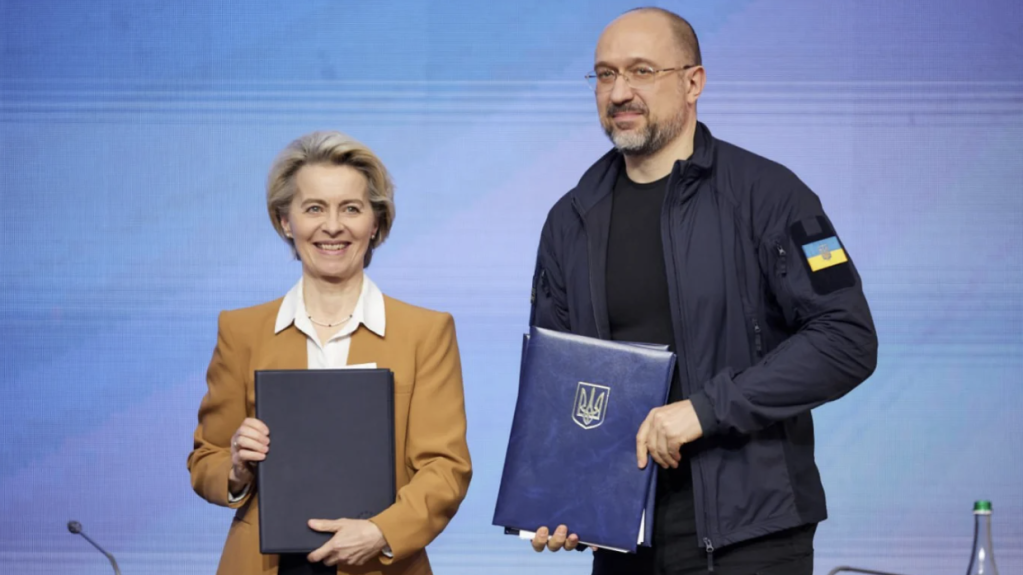
Picture : Denis Shmygal and Ursula von der Leyen, after the signature of the Agreement in Kyiv, on February 2nd, 2023.
By Anthony Marcus, correspondent for Eurasia Business News, February 2, 2023
During the meeting of the Ukrainian government and representatives of the European Commission in Kyiv, an agreement was signed today on Ukraine’s participation in the EU’s Single Market program. A memorandum on the strategic partnership of the countries in the field of renewable gases, hydrogen, biomethane and other synthetic gases was also signed. This was announced by Prime minister of Ukraine Denis Shmygal.
“The budget of the single market program is € 4.2 billion, and one of its main components is the development of business competitiveness. Our participation in this project will contribute to additional support for Ukrainian entrepreneurs, who are the foundation of our economy,” Denis Shmygal wrote on Facebook.
The “Single Market” is a program approved for the period from 2021 to 2027. Its goal is to simplify access to the markets of the EU countries and support business. The program also provides for support for the competitiveness of small and medium-sized businesses in the EU countries. € 1 billion from the budget is planned to be used to finance the COSME program, which specializes in particular in ensuring entrepreneurs’ access to European financing.
President of the European Commission Ursula von der Leyen also announced Ukraine’s accession to several EU programs and a proposal to extend the suspension of import duties on all Ukrainian exports for another year.
In addition, the EU has pledged to double a military aid programme for Ukraine by training an extra 15,000 soldiers.
On Thursday, European Commission President Ursula von der Leyen, EU Foreign Minister Josep Borrell and 14 key European Commissioners arrived in Kyiv to hold a joint meeting with the Ukrainian government on the eve of the EU-Ukraine summit, which will be held on Friday.
Poland, together with a number of Eastern European countries, is asking for the return of customs duties on agricultural products from Ukraine: the duty-free import allowed to it, the applicants believe, complicates the work of European farmers. This issue will be discussed at the EU-Ukraine summit, which will be held on February 3 in Kyiv.
The history of agreements between the European Union (EU) and Ukraine can be traced back to the 1990s, when Ukraine first expressed interest in closer ties with the EU. Over the years, several agreements have been signed between the two sides, which have shaped the nature of their relationship.
Partnership and Cooperation Agreement (PCA): This agreement was signed in 1994 and established a framework for political and economic cooperation between the EU and Ukraine. The PCA was the first comprehensive agreement between the EU and Ukraine.
Association Agreement: In 2014, the EU and Ukraine signed the Association Agreement, which aimed to deepen their political and economic ties and pave the way for Ukraine’s integration into the EU. The agreement covers a range of areas, including trade, investment, justice, and security.
Deep and Comprehensive Free Trade Area (DCFTA): The DCFTA is a key component of the Association Agreement, and it aims to liberalize trade between the EU and Ukraine by removing tariffs and other trade barriers. This treaty was signed in June 2014.
Visa Liberalization: In 2017, the EU and Ukraine signed an agreement on visa liberalization, which allows the 45 million of Ukrainian citizens to enter the EU for a period of stay of 90 days in any 180-day period.
Support for Reforms: The EU has provided extensive support to Ukraine in recent years, including financial assistance, technical support, and capacity building, to help the country implement reforms and improve governance.
These agreements reflect the EU’s commitment to supporting Ukraine’s political and economic development and strengthening its ties with the EU. However, the relationship between the EU and Ukraine has been strained at times, particularly in the aftermath of the Ukrainian Revolution in 2014 and the ongoing conflict in eastern Ukraine. Since the outbreak of the war with Russia on February 24, 2022, the EU has been activelhy supporting Ukraine in its war effort.
***
Thank you for being among our readers.
Our community already has nearly 100,000 members.
Sign up to receive our exclusive articles.
To receive premium content, subscribe, it’s only €8.99/month. You will see the Restricted Posts signup form.
Support us by sharing our posts!
© Copyright 2023 – Eurasia Business News
Source link
